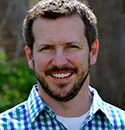We have much more to do and your continued support is needed now more than ever.
NWF Scientist Returns to the Gulf
 Dr. Doug Inkley, the National Wildlife Federation’s senior scientist, has returned to the Gulf Coast. It’s his third trip since the BP oil disaster began more than three months ago. Doug is quoted in this week’s Rolling Stone cover story on the disaster, The Poisoning:
Dr. Doug Inkley, the National Wildlife Federation’s senior scientist, has returned to the Gulf Coast. It’s his third trip since the BP oil disaster began more than three months ago. Doug is quoted in this week’s Rolling Stone cover story on the disaster, The Poisoning:
From an environmental standpoint, the BP blowout could not have occurred in a worse place. The warm currents of the Gulf make it one of the most productive ecosystems on the planet, home to 1,200 species of fish, five species of endangered sea turtles, scores of mammals like bottlenose dolphins and millions of migratory birds. Even worse, the spill took place in “biological spring,” the moment when the entire Gulf comes to life – the migratory birds returning to nest, the sperm whales nudging along the edge of the continental shelf, the bluefin tuna laying their eggs, the pelican eggs cracking open in the rookeries. In the first three months alone, the spill has killed 1,978 birds, 463 sea turtles and 59 marine mammals – and that’s just the official tally.
“No list can ever do justice to what’s happening in the Gulf,” says Doug Inkley, a senior scientist for the National Wildlife Federation. “The birds that get sick and die in the wetlands will never be found. And there are so many things we are not counting. Who is out there counting the mortality among deepwater squid, which are important to the survival of sperm whales? Who is out there counting the impact on plankton, which are key to the Gulf’s food chain?”
We’ll have much more from Doug’s latest trip to the Gulf as the week goes on.
For all the latest news on how the oil spill is impacting the Gulf Coast’s wildlife & to learn how you can help, visit NWF.org/OilSpill.






















